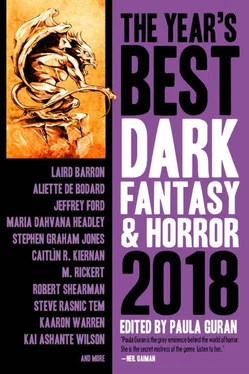The beast had been with him from the time before he was. It found its skin off the stone-cradled coast of Baleswar and took teeth from the mouths of sightless catfish slicked in the muds of the Hooghly; it found fingers in the splintered iron wreck of a sunken steamer—those half-eaten Company men suspended in the deep watched, unseeing—and then pushed onward, upstream, to break the surface off Kolkata’s restless, sweat-streaked banks. Its lips—what practiced, deceitful lips—it pinched from a gora in a white cotton shirt and crisp straw boater, bent at the waist over the rail of a ferryboat, his clean-shaven face so close they all but kissed as it rose to meet him.
On the banks it found a Bengali farmer, a devout Muslim and a newlywed, too, and it buried itself deep inside him. It stayed with him for a year, in guileless sleep, until the man and his wife sailed that unbordered ocean to a place they knew nothing of, a world they could hardly imagine but was richly described by their sahibs and Her Majesty’s Officers.
One night when the ocean churned and the ship’s passengers cowered in darkness, all lanterns gone out, the merchant lay with his wife. The beast slicked itself inside the man’s heavy cock and spread itself inside his wife and when, at last, they emerged from the belly of that ship and stepped onto Georgetown’s streets, the beast lived inside yet another: a child who would be born to this unknown country, this ancient jungle.
Father had a motorcycle that had been brought by ship from London; a sleek, chrome-buffed Norton Manx painted a royal oxblood and fitted with all the most fashionable accoutrements. Though the sugar mill was only just over a mile from the house, Father still drove the bike there and back every day.
“She’s got enough space for the both of us,” he assured Harry as they readied themselves the following morning. “Just be certain to hold onto me good and tight—they need to have another go at paving this road.”
They puttered down the main road slowly, Father steering around rain-filled potholes but still managing to hit bumps and stones that jarred them both. The other officers’ homes spun by, just beyond the wooden fence, and when they had passed the compound he took a turn that put them on a dirt road that traced the edge of the river. Indian and Arawak fishermen worked the banks, hauling crab pots out of the water, throwing nets, dragging buckets out of their mud-streaked boats that writhed with the morning’s catches: eel, chiclid, bushymouth catfish, snook, croakers, and lungfish as long as Harry’s arm.
This flew by them, too, and soon they were past all the houses, past the docks. Harry knew they were close when they came to the prison: a building as uncannily tall as it was narrow, set back from the road, with rows and rows of blacked-out windows. A hundred years past, maybe more, it had been one of the colony’s first sugar refineries; its thick walls and iron-barred doors made it a prime candidate when the British decided the city needed holding cells.
Father’s mill was just back from the prison, over the railroad tracks. It was, from what Harry could see beyond the stepped fence running the perimeter, like a small city itself. Several small, shack-like buildings encircled a three-story, whitewashed structure with a slanted roof. They crossed the fence, and Father slowed the motorcycle.
The mill was already busy. Sweating men—Indian and black alike—heaved six- and eight-foot bundles of sugarcane out of the backs of trucks parked in the lot. They pressed the cane along what looked like a low gate that was banded together by a long iron bar along its top. The bottom of the gate swung inward, and the loose cane fell onto a conveyor that rolled it into the mill. Men stood on the other side of the low gate, huge bamboo rakes in hand, pulling the cane down onto the conveyor belt.
“Come,” Father said after he’d parked in front of the mill. The motorbike’s polished, red chassis seemed alien amidst the white-and-brown tedium of the cane workers. “Let’s find Uncle Amir.”
The interior of the mill was darker and noisier than Harry had expected. The conveyor belt carried the sugarcane into a central chamber filled with machines whose purposes he could hardly guess at: steel-sided shredders with rows of spinning teeth, thick pipes that ran the walls and hissed with steam, and vats filled with dark, boiling liquids. Men with heavy gloves moved like ants in an underground colony: each knowing exactly where he was going, but none saying a word to the others.
“He should be up here,” Father said, shouldering open a door labeled Management Only . They climbed a steep flight of stairs that doubled back on itself and opened into a small room with a glass wall. The whole mill was visible beyond the glass, much as fish could be watched in a child’s aquarium.
“Harry! So glad you came today.” Uncle Amir stood from behind a small oak desk, came over to shake his hands. “I haven’t seen you in so long, and now we get to see each other twice in one week! What grand luck. Would you like milk tea?”
Harry shook his head, but Father insisted on tea for the three of them.
While Amir boiled water, Father enumerated the job’s various daily tasks—invoices, vendor inquiries, customer relations, and management. “It’s tough keeping the coolies on track and making sure production is where the bosses need it to be. So much slips through the cracks. Right?” he asked, looking to Uncle Amir.
“Right,” he said with a nod as he poured tea from a steaming pot.
Father sat Harry down at a chair with a stack of invoices—“clerical work keeps the mind organized, son”—and retreated to his own desk to answer the ringing rotary phone.
Harry’s concentration left him after alphabetizing the first six. He sat beside the only window in the room that looked outside. The view was bleak—mostly men hauling cane from the trucks, staggering with the weight—but the window had a small, wooden ledge and on the ledge was a dead caterpillar. It was an enormous, bloated creature that had only recently died. He peered closer: he recognized the markings. Mother had several moths in her collection with the same rows of dots on the wings, the same shallow—
—Harry blinked. The caterpillar was dead, clearly dead, yet could have sworn he’d seen its skin ripple. Just a slight protuberance, as if some small heart, deep inside, beat once.
His stomach turned at the thought, though the beast inside him didn’t move. In fact, despite being so far from the compound, the beast had hardly protested at all. It purred complacently—contentedly, even—from the thin lining of his intestines; he could barely tell it was there.
Somewhere inside the mill, men started yelling. This was followed by the sound of metal shrieking against metal and a long hiss of steam.
“Amir?” Father said.
Uncle Amir looked up from his paperwork, keeping his gaze away from the window onto the workers.
“Amir,” Father repeated, hanging up the phone. “Would you go look into that?”
Uncle Amir feigned surprise. “Oh yes! Yes, of course. I’ll—I’ll just be back.” He nearly tripped over himself getting down the stairs.
Father gave a pained sigh and, when Harry didn’t inquire as to the reason for the sigh, he elaborated: “He’s been having trouble with the men. He’s usually so good with them, but this blasted People’s Progressive Party is driving them apart. Amir’s a reasonable man—he understands the benefits of us being here, running things. All coolies are not as reasonable as your Uncle, Harry. That’s a good first lesson.”
The caterpillar’s skin had started moving again. First, one pulse—a single, small heartbeat—but then it came again, more strongly, pushing up against the necrotic flesh, distending it. The caterpillar’s skin tore with the pressure, and a small mouth emerged from inside: two black mandibles, sharp as sickles. A pin-waisted wasp pulled itself free, its wings slicked with the caterpillar’s viscera.
Читать дальше












